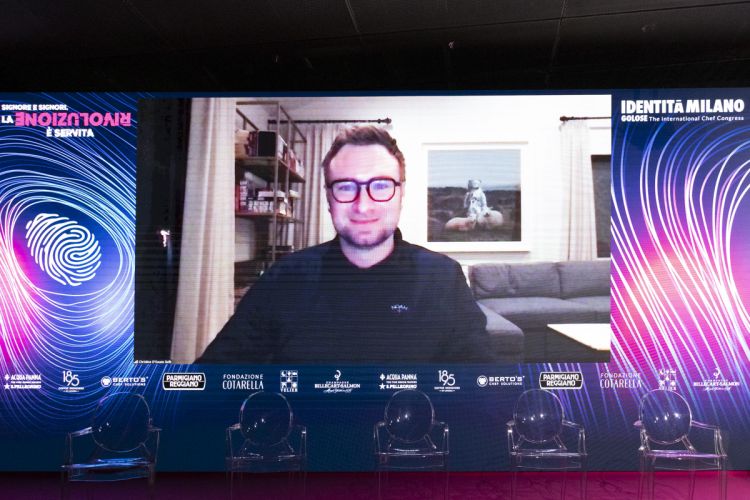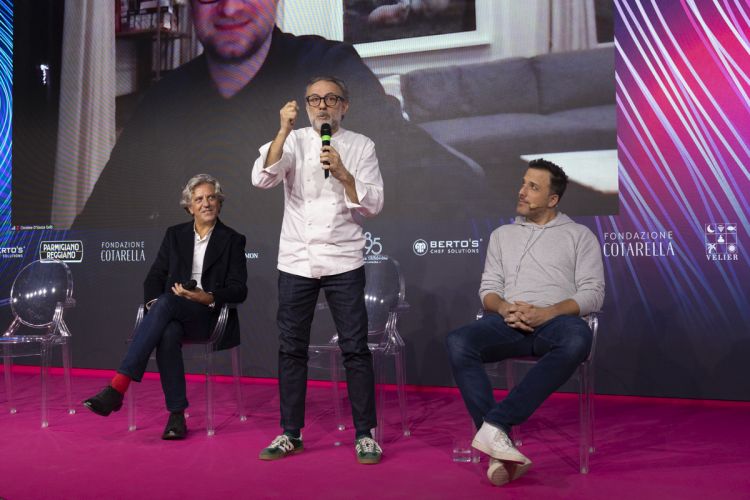In Davide Rampello's vision, if we were to think of the first truly revolutionary television cooking programme, we would have to look back and recall Mario Soldati's Viaggio nella valle del Po. The innovative aspect was not so much the representation of a recipe, the story of a dish, but that unique, total immersion in the dense texture of the territory. Mario Soldati recounts the landscape, the people, the local economy because he was a cultured man, a thoughtful man. Mario Soldati was not a specialist, but he was gifted with sensitivity, and it is precisely this virtue that leads man to the most extraordinary discoveries.
Looking at the present, however, we asked ourselves who, through their vision, their contribution, had rewritten, broken the rules of cooking on the small screen. We at Identità have tried to answer by inviting four great protagonists and pioneers on the stage of the Auditorium, each of whom has transferred the nuances of their experience, the substance of the inner man, before the eyes of the world, to the small screen. Pondering what to communicate, what language to use to address a vast audience, what 'seasonings' to use, why choose one subject rather than another, letting every image, word, and thought maintain its transparency.
Davide Gelb, author and executive producer of Chef's Table, Brian McGinn executive producer and director of Chef's Table, Massimo Bottura, chef of Osteria Francescana and star of the first episode of series 1 of Chef's Table, and Giorgio Locatelli, chef of Locanda Locatelli and judge of MasterChef Italia talked about it at Identità Talk, during a meeting moderated by Gabriele Zanatta.
We start with Brian McGinn and David Gelb. The great success of Chef's Table was anticipated by Jiro Dreams of sushi (2011). Can we say that the Chef's Table series was born right from that docufilm? What happened exactly?

Joining from the United States, David Gelb
: “The docufilm featuring Japanese sushi master
Jiro Ono certainly had a decisive impact because for the first time it told the personal story of a man, a genius; but above all, we see how, starting from his life, his cuisine and the philosophy from which it originates are gradually defined.
Chef's Table spreads disruptive values: breaking with the ideas and stereotypes we had built up about cooking on TV. Exactly what kind of ideas did you want to break?
Brian McGinn: “On TV, cooking has always appeared in the form of a competition; the intention of Chef's Table was instead to bring emotion to the centre of everything, shifting the focus to everything that surrounds the chef, from the landscape to which he is connected, to the domestic sphere to his origins.
In June 2016, the first episode of Chef's Table season 1 features Massimo Bottura. Why him and not someone else, perhaps a chef from the first or subsequent series?
David Gelb: “The moment we started reading about Massimo Bottura, it immediately seemed to us that this man had a great message to communicate, with a very strong, powerful language; each of his dishes has a story to tell. Sure, some try; but not everyone succeeds with every single dish. We knew the world would fall in love with him... plus he’s Italian.”
And now, Massimo Bottura.
In the past you have always been quite reluctant to appear on TV. What convinced you in the end to accept Brian and David's proposal?

Left to right, Giorgio Locatelli, Massimo Bottura and Brian McGinn
I have always thought that television is somehow able to manipulate things, to show something different from reality. Instead, the message has to be as true as possible and contain something important to communicate. That is why it is crucial to choose the right people to embark on a communication journey. So when they asked me to participate, I was curious
because I always leave the door open to the unexpected, and I accepted the moment they agreed to my request to have
Davide Gelb as director. Why? Because of the obsession with quality that shines through in the docufilm
Jiro Dreams.”
The third Michelin star (November 2011), the top of the World's 50 Best Restaurants (in 2016 and 2018), the Chef's Table episode in 2015. In terms of media impact, how do you compare these three events? How have they changed your life as a chef?
“For me, three stars were the dream of a lifetime: I still remember standing in my father's office. I threw all the papers I had in front of me in the air, with the desire to bring the three stars to Emilia in my head. It was a crazy obsession and achieving that goal was an incomparable joy for me. The result? Osteria Francescana began to gain worldwide visibility: Belgium, France, the United States - gourmets from all over the world came, ordered à la carte, we opened large bottles of wine in the dining room, and turnover grew exponentially. A personal satisfaction, but also an economic one. The entry into the 50 best: the first time was in 2009 when Osteria became the best Italian restaurant in the ranking; then, a continuous fluctuation: Francescana, Celler and the Noma returned to the top positions for years and this proved to be a seed for the friendship that, backstage, was born between us chefs; it was not a competition, but a friendship. With this transition, Modena became a gastronomic destination, just like Girona or Copenhagen. Chef's Table, then amplified all this because the power of communication reaches the new generations. These days, 15/16 year-olds book a table for their families.”
In March 2021, Michelle Obama invited you to take part in the Netflix series 'Waffle+Mochi', dedicated to food education and aimed at children around the world. How was the experience? What role can TV play in this educational approach to food?
"Although I know her very well, when Michelle Obama calls you, it always has an effect. Barack is much more focused on climate change, while Michelle always had the education of less privileged US children at heart. The focus of the series, then, was to teach kids to eat healthy, to eat their vegetables, and to do so, we had the space of two episodes. And so far, so good: but there is one more request. To bring a dish into the series that Michelle couldn't miss: Oops, I dropped the lemon tart. Again? I think initially, it had already appeared everywhere. That was my initial thought, until Mrs. Obama offers me her personal reading of that dish, an interpretation I had never heard before: Oops teaches not to be afraid to make mistakes. Everyone can make mistakes, even the best chef in the world.”
And we come to Giorgio Locatelli. In 2013, you pioneered the series 'I Buongustai dell'arte' for Italian TV channel Sky Arte. Can you tell us something about that?
Giorgio Locatelli: “It was a programme created together with art critic Andrew Graham Dixon: it was the olive harvest season in southern Italy, I was there when I suddenly found myself chatting with Andrew, in a church, looking at a beautiful painting of a Madonna. A magical moment was born, we were transported to another dimension and an idea that we initially proposed to the BCC came to the surface: a programme that dealt with food and art in equal measure, perfectly balanced. After all, in both cases, we are talking about culture.
We now have six series, with a journey that starts in Sicily and then stretches across the whole of Italy; a great experience, an extraordinary cognitive process. To this we must add the power that TV and cinema have to fix something in time. I believe this is why Chef's Table is a programme that everyone talks about. Not only that: by listening to the chefs' stories, by learning their stories, the new generations realise that taking up this profession certainly requires a lot of effort, but it can lead to surprising results.”
Translated into English by Slawka G. Scarso